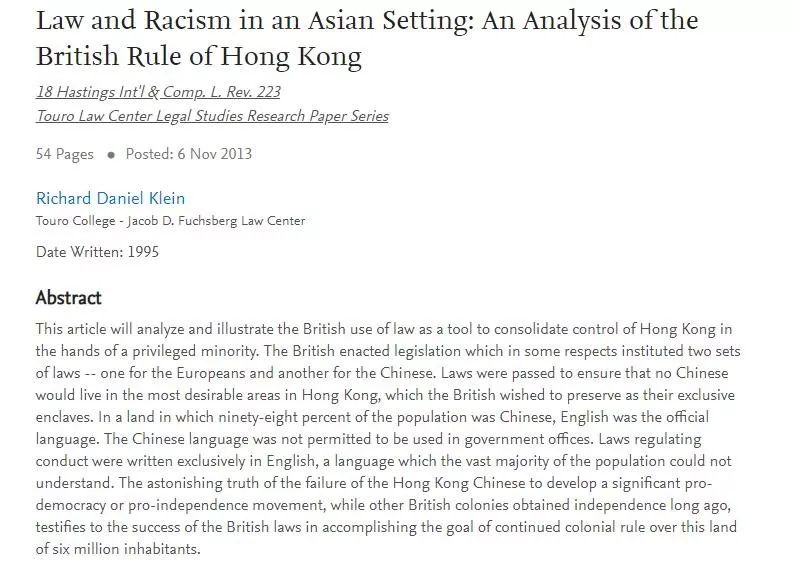|
马来西亚《星报》网站6月24日刊登星报媒体集团顾问、前董事经理拿督斯里黄振威文章《与中国共命运》 文:Wong Chun Wai 译:Kris
你真的不得不佩服英国人“会玩”。只要了解一点马来亚历史的人就知道,殖民时期的英国官员们从来都只说自己是顾问。
他们是英国公务员,但他们手里握着最终的决定权。
更糟糕的是,各个马来王朝的苏丹们——当时马来半岛名义上的统治者——都在英国人的“诱导”下认为自己仍然是掌管着国家。
在英属马来亚——包括18至20世纪马来半岛和新加坡受英国统治的许多国家——英国殖民官员十分精明地让苏丹裁定宗教和民俗事务,然后包揽了其他几乎所有事务的最终决定权。
也就是说,理论上马来亚的统治者还是苏丹,他们可以继续享受荣华富贵,保留皇家威仪,但他们的羽翼却被剪除了。
这是马来联邦(federated Malay states)的情况,而在海峡殖民地(Strait Settlements),英国又另外委任了总督。
比如马六甲,尽管它历史上有辉煌的马六甲苏丹王朝(明史称作满剌加国),可它仍然跟槟城和新加坡一样,得接受一个“空降”的白人总督。
1888年英国在马来亚和新加坡的属地
上周,马来西亚总理马哈蒂尔·穆罕默德非常恰当地在讲话中指出,“马来西亚虽说属于大英共荣圈(译注:一般译为英联邦),但它与某些支配财富的繁荣国家之间没什么共同点……英国人承认马来苏丹的统治权,但苏丹们却从来没有真正统治过。所以当他们(英国人)批评我们独裁的时候,我想他们说这话其实自己也不当真。”
英国人的手段还不止于此。进入20世纪后,英国殖民者为了镇压马来亚共产党武装,制定了许多高压专制的法律,比如《内部安全法令》(Internal Security Act)。根据《内安法令》规定,当局可以对被怀疑的个人实施单独拘禁60天,并且可以在不开庭审理的情况下延长扣留期至两年。
尽管下面采取雷霆手段,英国人仍然可以面不改色地告诉世界,是他们让当地人学会了正义、民主和公平等原则。英国人还说,1941年日本侵略马来亚以及1957年马来亚联合邦独立时,当地人民都对抛弃他们的英国流下了不舍的泪水。
1957年,当米字旗在马来西亚大地落下时,开国总理东古·阿卜杜勒·拉赫曼保留了《内安法令》,并用它来拘留共产主义倾向的左翼分子。今天,多数马来西亚人不知道,《内安法令》最初其实是英国人的杰作。
曾经有个人在《内安法令》下度过多年铁窗生涯,先是被英国人监禁,后来被马来西亚政府关押,他说,马来西亚独立前后唯一的不同在于,“英国狱警每天早上会笑呵呵地走过来跟狱友们道声早安。”
1957年8月31日,马来亚联合邦从英国独立
快进到2019年,香港修订逃犯条例,拟允许向中国内地引渡刑事案件嫌疑人,结果引发了争议和国际关注。
香港和外界的关切点在于,不论是香港居民、外国人还是中国公民,只要是内地通缉的逃犯,都可能被引渡到内地。而香港人宁愿上香港法庭,也不愿意在内地受审,他们对香港的英式法庭更有信心——因为它继承了英国的法律系统,法官和律师大多也是英国培训出来的。
他们的疑虑固然是可以理解的,但究竟有多少反对者是打心眼里觉得自己可能被引渡到内地受审的,还要打一个问号。
更具有讽刺意义的是,英国殖民政府和许多政府一样,也把法律当作一种常用工具,来巩固其对香港的控制,而控制权掌握在少数特权阶层手里。
美国法律专家理查德·丹尼尔·克莱恩详细描写过港英时期的法律系统,“在某种意义上来看,英国人制定了两套法律,一套适用于欧洲人,一套适用于中国人。他们通过立法确保中国人不得居住在香港最黄金的地段,这些地方是英国人希望独占的飞地。
“在这片98%人口都是中国人的土地上,官方语言是英语。
“政府公署不允许使用中文。
“管制民众行为的法律统统以英文写就,而这是一门绝大多数香港本地人不懂的语言。
“在其他英国殖民地早已争取到独立的情况下,香港的中国人竟然没有发展出成规模的民主独立运动,这个令人惊讶失败证明了英国法律的成功,后者达到了它在这个有600万居民的小岛上延续殖民统治的目标。”
理查德·丹尼尔·克莱恩论文《亚洲背景下的法律和种族主义:对港英统治的分析》
已故的斯坦福大学历史学者陳明銶曾在一篇法律评论报告里写道:“对多数香港人而言,维持现有的法律系统十分重要,因为它关系到后殖民时期香港行政特区根据‘一国两制’规则在中国主权之下享有的高度自主权。
“然而,这种广泛存在的认识是有瑕疵的,理由很简单:香港今天的法律系统存在严重缺陷。它不但在根源上是外来的……显著不同于中华人民共和国的法律系统,并且存在缺陷与不足。”
港英时期,不论抗议采取何等形式,都从来没有被真正重视过。实际上人们也没有发起什么抗议,因为在长达一个半世纪的殖民统治时期,英国不允许香港选举。
直到回归之前两年,也就是1995年,香港立法局才终于进行了议员选举,那是港英时期第一次也是最后一次立法局全面选举。民主自由果然名不虚传。
1995年香港立法局选举结果总览
在所有政府机构高级岗位都被白人占据的日子里,没有香港人站出来抗议,尽管不少资质良好的香港本地公务员的英语水平甚至超过了他们的上司。
比如香港警队一直由英国人领导,而且我们也知道70年代他们有多腐败,可香港人反对过吗?更直白一点地说,他们吱过声吗?
说句公道话,确实是英国人把香港从荒芜的小岛建设成国际都会,他们留下了运作良好、备受国际社会信任的行政体系。
但是,在1997年香港回归中国那一刻起,英国人对香港的责任已经终结了。英国现在没有任何权利对中国指手画脚,告诉中国人应该做什么不应该做什么。
但为什么,香港偏偏有一小部分人对内地怀着怨恨的情绪,却渴望由英国统治呢?
近年来,一些香港“本土派”为了抗议所谓“粗暴干预”在足球比赛上羞辱国歌,甚至用英语喊“香港不是中国”的口号。此外还有一小撮人在搞“香港回归联合王国运动”,渴望再次接受英国统治,结果沦为笑柄。也还有些香港人喜欢说什么“旧日好时光”,缅怀英国殖民统治。
如果说中国人可以从英属马来亚的历史里汲取什么经验的话,那就是英国人管理殖民地的手段真的很高,他们无需采取粗暴手段,却能把殖民地的丰富资源劫掠一空。
北京方面或许可以在香港问题上采取更柔和的态度,拿出更大的耐心。时间在中国这一方,所以完全不用着急,更何况现在中国在许多其他问题上特别需要赢得国际社会的支持,因此不要冒舆论风险。
当然,香港狂徒袭警事件被内地十几亿人看在眼里,政府当然要考虑民意。见证过苏联崩溃的历史,中国领导人知道维护民族自豪感和民族尊严有多么重要。当CNN或BBC的记者大谈特谈个人权利的时候,他们其实根本不知道中国政府和全世界华人华侨对此的看法。
1997年香港回归
香港人必须接受一个现实:香港主权属于中国,而且香港的独立性和重要性都会慢慢减弱。内地不再像过去那样需要香港作为一个战略性金融中心,因为北京上海等内地城市已经超过了香港。
香港人受到的另外一个打击是,当年英国政府拒绝接受原来拿英国海外领地公民护照的350万香港人作为英国公民。
内地方面需要下更大力气赢得香港民心,让他们感受到自己从根本上属于中国和中国文化,培养他们的民族自豪感。
香港人是在与内地迥异的政治和法律环境下成长起来的,因此具有更强的自主意识,这是可以理解的。但更重要的事实是,香港人民的命运跟英国没有半毛钱关系,但与中国紧密相连,而北京方面要解决的问题是,如何让香港人民感受到这一点,理解这一点,并且为此感到骄傲。
最后说到引渡这件事,不要忘了美国正在争取从英国引渡维基解密创始人朱利安·阿桑奇。阿桑奇是谁?他不过是一个揭发黑幕的记者,却要面临最严重的刑罚,据说他违反了美国《1917年反间谍法案》,但具体如何外界也不知道。
还没完呢。美国还要从加拿大引渡华为首席财务官孟晚舟,扣在她头上的罪名,闻起来有种莫须有的味道。
A destiny tied to China
YOU’VE got to hand it to the British because they are really the masters at the game. Anyone who has studied basic Malayan history would know that officials during colonial times merely identified themselves as advisers.
They were British civil servants, but they called the shots.
Adding insult to injury, the Malay Rulers – as the Sultans were called then – were “led” to believe they still ran the states.
Under British Malaya – a set of states on the Malay peninsula and Singapore under British rule between the 18th and 20th centuries – British colonial officials had the last say on almost everything except religion and customary matters, which they cleverly left to the palaces.
So, in theory, the Rulers held their positions, kept their perks and all royal protocols befitting royalty, but their wings were clipped.
These were the federated states, but in the case of Straits Settlement states, British governors were appointed.
So, the famous Malacca Sultanate, with its rich lineage of Sultans, found itself having a governor, a Caucasian, as did Penang and Singapore.
Tun Dr Mahathir Mohamad put it aptly when he said last week in his speech in Britain that “Malaysia is a member of the Commonwealth, but there is nothing much in common with the wealth dominated by certain countries”.
“The British acknowledged the Malay Sultans as Rulers, but the Sultans never ruled. Therefore, when they criticised us as dictators, I don’t think they really meant it,” he said.
There was more. Under British rule in the 20th century, the British introduced repressive laws such as the Internal Security Act (ISA), used against communist insurgents.
Under the ISA, a person could be held for 60 days in solitary confinement and up to two years’ extension without trial.
Despite this, the British told the world, with a straight face, that they taught us, the natives, principles of justice, democracy and fairness, and that we all cried when they abandoned us when the Japanese invaded Malaya in 1941, and when we gained independence in 1957.
Our first prime minister, Tunku Abdul Rahman, kept the law when the Union Jack was lowered in 1957, which marked our independence.
Not many Malaysians are aware that the British imposed the ISA. Of course, during that era, only the radical left-wingers, with communist tendencies, were detained.
One ISA detainee, who was imprisoned under the British and then under the Malaysian government, said: “With the British guards, they would cheerily come every morning and wished the detainees a good day.” That was the difference.
Fast forward to 2019 and the massive turnout in Hong Kong against the controversial extradition Bill, with proposed amendments allowing for criminal suspects to be sent to China, has made international news.
It has prompted concern in Hong Kong and elsewhere that anyone from the city’s residents to foreign and Chinese nationals living or travelling through the international financial hub could be at risk if they were wanted by Beijing.
Basically, Hong Kong residents would rather face HK courts than be deported to mainland China.
Many have no faith in China’s judicial system compared to the British-style HK courts, which inherited the British legal system, and where most of the judges and lawyers are also British-trained.
The HK people can’t be blamed for their anger and suspicion since the international community has read of Chinese nationals being short-changed, or even neglected by the courts in the pursuit of justice.
And we can even read of income tax defaulters, under investigation, being hauled off to undisclosed locations, while dissidents have been taken away, and disappeared without a trace.
This bad press, verified or otherwise, would have scared many people, even though one wonders how many of these HK protesters believe, in their hearts of hearts, that they would ever get arrested and sent to China.
But the irony is that under British rule in HK, like many governments, the British widely used the law as a tool to consolidate control of Hong Kong in the hands of a privileged minority.
Legal expert Richard Daniel Klien wrote that “the British enacted legislation which in some respects instituted two sets of laws – one for the Europeans and another for the Chinese. Laws were passed to ensure no Chinese would live in the most desirable parts of Hong Kong, which the British wished to preserve as their exclusive enclaves.
“In a land in which ninety-eight per cent of the population were Chinese, English was the official language.
“The Chinese language was not permitted to be used in government offices.
“Laws regulating conduct were written exclusively in English, a language which the vast majority of the population could not understand.
“The astonishing truth of the failure of the Hong Kong Chinese to develop a significant pro-democracy or pro-independence movement, while other British colonies obtained independence long ago, testifies to the success of the British laws in accomplishing the goal of continued colonial rule over this land of six million inhabitants.”
MK Chan wrote in a law review report that “to most people in Hong Kong, the preservation of the existing legal system is of crucial importance to the high degree of autonomy the post-colonial Hong Kong Special Administrative Region is supposed to enjoy under Chinese sovereignty according to the “One Country, Two Systems” formula.
“However, this widely shared perception is flawed for one simple reason: the legal system in Hong Kong today has its own serious defects. It is not only alien in origin,” and “markedly different from the legal system in the People’s Republic of China but also defective and inadequate”.
No protest has gained voice, neither through yellow shirts nor umbrellas. And no protests were staged because the British didn’t allow elections during the colonial rule from over a century and a half.
The 1995 Hong Kong Legislative Council election for members of the Legislative Council of Hong Kong was only finally held that year – it was the first and last fully elected legislative election in the colonial period before the nation was returned to China two years later. So much for democracy and freedom.
No HK resident protested that only the white men could hold top posts in government bodies, places where there were many qualified HK civil servants who could speak and write in English better than their superiors.
To put it bluntly, there was not even a squeak – and we know how corrupt the HK police were in the 1970s – about the force being headed by Britons.
To be fair, the British transformed HK from a barren island to an international hub, with a working administration system that has won the confidence of the international community.
However, the responsibility of the British ended in 1997 when HK was handed over to the Chinese. It has lost its right to tell the Chinese what to do.
But what has brought this resentment towards China, from HK Chinese people, and perhaps, even a yearning, for British rule?
Not long ago, it was reported that some localists had taken to thumbing their nose at “China’s heavy-handed meddling” by waving the British flag at football matches, booing the Chinese anthem and chanting “We are Hong Kong! Hong Kong is not China!” in English.
Reports have also surfaced about a small Hong Kong-United Kingdom Reunification Campaign, which angled for a return to British rule but ultimately dismissed as quirky.
Then there are HK people who talk about the “good times” under British rule.
If there is a history lesson which the Chinese can learn from British Malaya, it’s that the Brits administered their colonies well and without the need for any heavy-handed approaches, even as they robbed these colonies of their rich minerals.
Reports of Beijing’s transgressions in the territory, such as the kidnapping by mainland agents of local booksellers, or the National People’s Congress purportedly stepping into local judicial cases, won’t win the hearts of the HK people.
Beijing must put on a softer face and display plenty of patience in dealing with HK. There is really no rush for China, especially with risking an international black eye at a time when it can ill afford to do so.
Yes, China is concerned about how its billion people will react if they see these hot-headed HK protesters abusing policemen.
The lessons from the breakup of the Soviet Union – and the wounded pride and dignity that follows – are always etched in the minds of Chinese leaders.
When CNN and BBC reporters talk about individual rights, they have no idea what Beijing or even the Chinese diaspora think.
But the people of HK must also accept the harsh reality – HK is now China’s sovereignty, and more and more of its independence, or even importance, will slowly fade away.
China doesn’t need HK as much as it used to as a strategic financial hub, because Chinese cities, including Beijing and Shanghai, have even eclipsed the former island nation. No matter how big or how long these protests run for, China knows the HK people don’t have the stamina, because rent and bills need to be paid, and protest sittings on streets don’t last anyway.
And the other blow is the British government’s refusal to grant citizenship to the 3.5 million Hongkongers born there under the British flag.
China needs to work harder on winning hearts and minds, and to make the HK people feel they are a fundamental part of China, and Chinese culture and pride.
HK people have always been independent because they were brought up differently and under different sets of political and legal systems, and that must be understood. There is no need to ramp through any laws, indicating that the HK people are unhappy.
The destiny of the HK people lies with China, and not Britain, but the challenge for Beijing is to make the people of HK feel those sentiments and be proud of it.
And speaking of extradition, let’s not forget that the US is also seeking to get WikiLeaks founder Julian Assange extradited from the UK for alleged crimes under the Espionage Act 1917, of which remains unclear.
He is the first journalist to have the book thrown at him for whistleblowing.
That’s not all. The US wants Huawei chief financial office Sabrina Meng Wanzhou to be extradited from Canada over charges which smell suspiciously like trumped up accusations.
(End) |
汉唐归来
惟有中华
惟有中华








